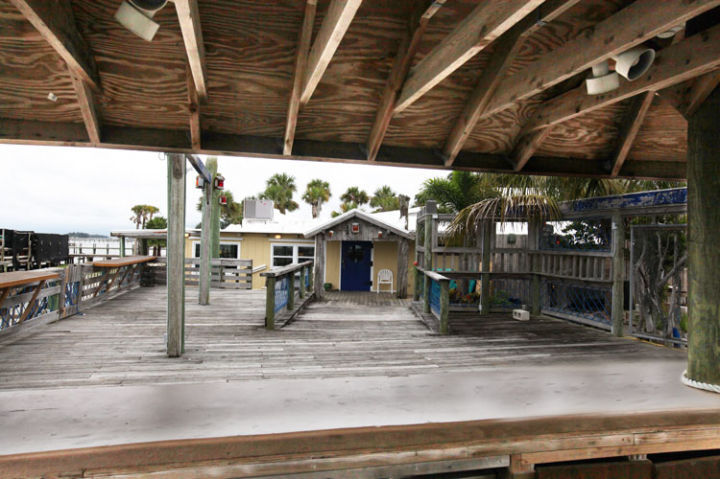
SEBASTIAN — The City of Sebastian is asking the court to dismiss a lawsuit that was filed against it by the owners of a restaurant that briefly operated at the city’s working waterfront project in 2011.
Vero Beach attorney Buck Vocelle was brought on to assist the city in handling the lawsuit and filed the motion to dismiss late last week.
Vocelle argues, in part, that Fisherman’s Landing Restaurant’s complaint isn’t with the city, but with the nonprofit fishermen’s group, Fisherman’s Landing Sebastian.
It is not known when the judge will make a ruling on the motion to dismiss the city from the lawsuit.
The restaurant had a sub-lease with the fish market in the building, not with the city, Vocelle points out in the motion.
On that basis alone, the city should be removed from the suit, he states.
The restaurant, run by Debbie McManus and her family, alleges that the city, the fishermen’s group, and Crab-E Bill’s Indian River Seafood, wooed them to open the restaurant and make improvements to the site. Attorney John Madden, of Stuart, filed the suit on behalf of Fisherman’s Landing Restaurant, which was in operation between September and October 2011, and is seeking more than $15,000 in damages – the threshold needed to get the lawsuit heard in Circuit Court.
Madden states in the lawsuit that the restaurant made more than $100,000 worth of improvements to the former Hurricane Harbor property, bringing in a commercial-grade kitchen, and paid thousands of dollars in rent.
The lawsuit makes two complaints – that the defendants fraudulently induced the restaurant to set up in the working waterfront building formerly known as Hurricane Harbor and that the defendants unjustly benefited from the work the restaurant did.
Not so, according to Vocelle’s motion to dismiss.
The lawsuit against the city and the other defendants also alleges that they knew how the restaurant was building out the kitchen and never pointed out that it was beyond the scope of the Stan Mayfield Working Waterfront Grant and related management plan.
“During the course of the build out, representatives of the City of Sebastian, (Fisherman’s Landing Sebastian), and (Crab-E Bill’s Indian River Seafood), often toured the premises and in fact, even made recommendations to (the restaurant) as to the build out and set up of the restaurant area,” the lawsuit reads.
The suit also claims that City Manager Al Minner came into the restaurant during the first week of its opening and had dinner with his wife at the bar.
“Nothing was said as to how the restaurant was operating at that point in time,” the lawsuit reads.
So who should have ensured the restaurant knew the conditions placed on the food service? The restaurant argues that it didn’t know about the plan, only that it had an agreement with Crab-E Bill’s to open an eatery.
Vocelle contends that it was not incumbent upon the city to address the changes to the kitchen or its operation, noting that the sublease between the restaurant and Fisherman’s Landing Sebastian states that the written document “contains the entire agreement between the parties and there are no further or other agreements or understandings, written or oral in effect between the parties relating to its subject matter.”
Vocelle also points out that the sublease the restaurant had refers back to the Stan Mayfield Working Waterfront Grant and the accompanying management plan, under which the restaurant was to operate.
Both documents refer to food service as being “limited” in nature.
The management plan, written more than a year before Fisherman’s Landing Restaurant signed onto the site, reads in part, “The City envisions offering approximately 6 tables for limited food service, served from the fish market counter. Limited food service means foods easily prepared that do not require a full scale kitchen (i.e. steamed clams, clam strips, or the ‘catch of the day’ prepared to go).”
Under the Stan Mayfield Working Waterfront Grant, the State of Florida has oversight of the project through the Florida Communities Trust.
Less than a month after the restaurant opened, the state sent a letter to the City of Sebastian, putting it on notice that the project was not in compliance with the grant and management plan.
The letter reads, in part, “the City’s management plan allows limited food service in conjunction with the fish market and approximately six tables. It does not allow for a restaurant operation, sit-down bar, Tiki bar or nightly live music which you currently have.”
In response, the city then sent a letter to Fishermen’s Landing Sebastian, notifying the non-profit group that their sub-lessee Fishermen’s Landing Restaurant was not complying with the grant and plan.
Shortly after the notification, the city began working with the fishermen’s group and the restaurant to pare down the food service and activities to make the site compliant.
Then, Fishermen’s Landing Restaurant owner Debbie McManus went before the Sebastian City Council and told the members that if the restaurant had to be curtailed to fit what had been described – what she called a “concession stand” – her business would fail, that was in late September.
A little more than two weeks later, on Oct. 18, McManus sent a letter to Crab-E Bill’s announcing her decision to close the restaurant effective the end of the month.



